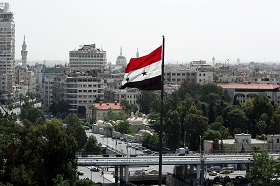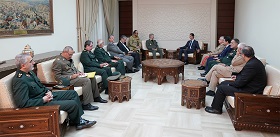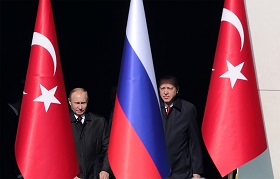The Syrian crisis continues to bring new surprises. Analysts are becoming increasingly concerned with the “mutating” configuration of relations among the global and regional actors, driven primarily by the developments in Idlib Governorate. These relations have always been volatile, but the dynamics of the current changes are far greater that they have been in the past, despite the situation stabilizing somewhat. We will touch upon some of the key aspects of this process only.
- Russian experts becoming critical in their assessments of relations with the Kurds.
- The United States moving away from the mutual understanding reached in Helsinki between President Trump and President Putin. Washington’s determination to drive Iran out of Syria, deal a crushing blow to Islamic State and facilitate the transit of power in the country, in the course of which President Bashar al-Assad should be removed.
- Turkey manoeuvring between Moscow and Washington in a desperate attempt to keep its positions in Syria. On the one hand, President of Turkey Recep Tayyip Erdogan has managed to secure a temporary suspension of the planned massive offensive by the Syrian Armed Forces in Idlib with support from Russia and Iran. On the other hand, Ankara has put Hay’at Tahrir al-Sham (formerly Jabhat al-Nusra, a.k.a. Al-Qaeda) on the list of terrorist organizations.
- The significant increase in Israel’s military assistance to anti-government groups in Syria.
The Syrian crisis continues to bring new surprises. Analysts are becoming increasingly concerned with the “mutating” configuration of relations among the global and regional actors, driven primarily by the developments in Idlib Governorate. These relations have always been volatile, but the dynamics of the changes that are currently taking place are far greater that they have been in the past, despite the situation stabilizing somewhat. We will touch upon some of the key aspects of this process only.
Let us begin with the “Kurdish factor.” Although Russia is historically on friendly terms with the Syrian Kurds (and with the Kurds in general), some Russian experts have recently started criticizing the Kurds’ actions. They tend to disregard Russia’s long-standing sympathy for the Kurdish national movement, as well as the fact that the Kurds played a crucial role in the fight against Islamic State/Daesh (which is banned in the Russian Federation) and other terrorist groups operating in Syria. In fact, some of these experts (many of whom often appear on TV) have miraculously performed a U-turn from their previous position as advocates of Kurdish interests, who were only recently urging Russia to supply arms to the People’s Protection Units. This change in tone is primarily explained by the increasingly close cooperation between the Kurds and the Americans in Syria, as well as by their inability to establish constructive relations with Damascus. The Syrian authorities are certainly partly to blame for the fact that all talks with the Kurds have so far been in vain. Yet it is too early to say that these difficult negotiations have failed altogether, especially given the rapidly changing situation. Nevertheless, Russia always prioritizes contacts with legitimate actors in a country, particularly in a friendly country like Syria.
Now onto the United States. The most significant recent change in Washington’s position has been its effective departure from the understanding reached in Helsinki between President Trump and President Putin. The U.S. administration threw that agreement out the window in a very pointed manner. British expert Alastair Crooke thinks that Washington’s new approach to the Syrian conflict, personified by the new Special Representative for Syria Engagement James Jeffrey, pursues the following goals: drive Iran out of the country; deliver a crushing strategic blow to Islamic State while strangling it economically; ensure a transition of power that would topple President Bashar al-Assad; and, first and foremost, prevent the United Stated from even appearing weak strategically.
The Turkish factor is also complex. Observers are under the impression that Ankara is currently manoeuvring between Moscow and Washington in a desperate attempt to secure a foothold in Syria. This much was evident at the summit on Syrian settlement between Russia, Turkey and Iran held in Tehran. On the one hand, Turkey’s President Recep Tayyip Erdogan appears to have successfully staved off the planned massive offensive in Idlib by the Syrian Army with support from Russia and Iran. On the other hand, Ankara has finally put Hay’at Tahrir al-Sham (formerly Jabhat al-Nusra, a.k.a. Al-Qaeda) on the list of terrorist organizations, something that it was unwilling to do before. To all appearances, Hay’at Tahrir al-Sham’s dominance in Idlib no longer allows Turkey to use this organization in the important game of maintaining its image as a defender of the Sunni world, an image that could be severely harmed if Ankara fails to distance itself resolutely from HTS. At the same time, Erdogan made sure that this concession to the other two “guarantor countries” could not possibly be interpreted as a step towards rapprochement with the Syrian government and departure from Turkey’s support for the Syrian opposition. Hence Erdogan’s deliberately harsh public statements and calls for “rescuing” the Idlib population from the Syrian Army’s offensive. This calls to mind Soviet writer Maxim Gorky’s “Whose side are you on, masters of culture?” which was actually addressed to American journalists. Still, Russia and Turkey remain very important economic and political partners.
Erdogan may be a master at political manoeuvring while firmly standing by his position on strategic issues, but he will be unable to stave off the Syrian offensive in Idlib forever. The current lull will not last for long. The Russian Aerospace Forces are already responding to the militants’ attacks with sporadic air strikes on their positions in Idlib. Erdogan is now prepared to take part in the destruction of HTS militants. The only problem, Crooke notes, is that the jihadists in Idlib have blended in with the local population. A similar situation was observed in Raqqa, which did not prevent the United States, the United Kingdom and France from delivering merciless aerial strikes on the city back in 2017 with the aim of destroying Islamic State, with “the number of artillery shells fired exceeding that anywhere since the Vietnam war.” Even if Ankara attempts to separate the jihadists from civilians and the “moderate” armed groups led by the Turkish-sponsored Muslim Brotherhood (which is precisely what the other two guarantor nations expect), will it be able to do so? Will it be possible to avoid a recurrence of the horrors and civilian losses experienced in Raqqa? Will Turkey be able to prevent new Syrian refugees from flooding in across the border to join the 3.5 million that are already there? And those jihadists who survive or lay down arms, where will they go? Will Ankara be willing to take them under its protection if they join the ranks of the “moderate” armed groups?
Trump and his political and military retinue are well aware of the fact that that Damascus, Moscow and Tehran are intent on fully cleansing the Syria of terrorists. Even Brett McGurk, Special Presidential Envoy for the Global Coalition to Counter ISIL, says that Idlib has become “the largest Al-Qaeda safe haven since 9/11.” It is imperative to weed out those who continue to supply the Syrian and Russian positions with advanced armed UAVs, whose spare parts come from “third countries.” It is clear that this situation will end sooner or later. However, the President of the United States continues to threaten Damascus with devastating massive strikes should al-Assad “stage a bloodbath in Idlib.” The allegations about the Syrian Army’s planned use of chemical weapons in the offensive against Idlib are intended exclusively to disguise the militants’ imminent acts of provocation involving chemical weapons.
If we are to take an unbiased look at the possible use of chemical weapons in Idlib – something that the Syrian pro-government forces and the opposition groups keep accusing each other of – it is necessary to separate the military and political factors. In military terms, resorting to chemical weapons (even from the most cynical point of view) would make no sense to al-Assad. First, he has much more effective anti-terrorist weapons. Second, his position is that of the winner who has already established control over most of the country’s territory. Third, the armed opposition groups can easily counter the effects of chemical weapons (especially of chlorine) with the use of the appropriate protection gear. And acquiring such gear should not present a problem, seeing as the militants have no shortage of sponsors. Similarly, the use of chemical weapons in no way ensures victory over the Syrian Army and its allies.
The political aspect is a different matter altogether. For al-Assad, using chemical weapons would be suicidal: it is impossible to conceal their use, and the inevitable retribution would annihilate the results of a successful military operation and cause irreparable damage to the Syrian leader’s reputation. This would constitute a totally unjustified and meaningless risk, but not for the armed groups of the opposition. For them, the use of chemical weapons, which could be attributed to Damascus with the help of Western intelligence services, is the only way to avoid defeat. In this case, the United States would find itself at war with the Syrian government. When the author suggested this scenario to several U.S. colleagues, they could find no arguments against it. In fact, this theory is more plausible than the one which states that Damascus has no chemical weapons. Indeed, the Syrian chemical stockpiles were withdrawn from the country and destroyed, but chlorine is easy to produce if need be. However, this runs counter to both the interests of Damascus and common sense. On the other hand, as we have already mentioned above, it makes sense to the radical Islamists and jihadists, which number in the tens of thousands in Idlib (Gen. [retired] Amos Yadlin, Director of Israel’s Institute of National Security Studies and former Head of the country's Military Intelligence Directorate, puts the number of Hay’at Tahrir al-Sham, or Nusra and Al-Qaeda insurgents at 100,000!). Many of these come from different countries across the globe. A contributor to the blog run by Col. Patrick Lang, a former member of the U.S. Military Intelligence Corps and the U.S. Army Special Forces, says he has friends in the government who hoped in 2017 that Trump was serious about pulling out of Syria. Now they are depressed and anxious. The same author describes the fact that the United States, United Kingdom, Saudi Arabia, Qatar and Turkey financed, armed and trained the militants, including the Islamist radicals associated with Al-Qaeda, as a “dirty secret” (although it is no secret really).
Israel also bankrolls the armed insurrection in Syria. In fact, each of the sponsors supports, financially and militarily, “its own” anti-government groups and not the others. The volume of this support varies. Until recently, little was known about Israel’s role. It appears that the country supplied weapons exclusively to groups operating in the southwest of Syria, only two of which have ever made headlines: Fursan al-Joulan and Liva Umar bin Al-Khattab. The former operates out of the city of Jubata al-Khashab in Quneitra Governorate, while the latter is based in Beit Jinn near Mount Hermon. According to some sources, in 2013 Israel was already supplying arms to the opposition. Israeli expert Elizabeth Tsurkov says that for a long time the country managed to keep its cooperation with these groups, as well as the very fact that it was rendering military assistance to the Syrian opposition, secret. Israel initially supplied the militants with U.S.-made M16 assault rifles, but then started delivering weapons that Iran had allegedly been supplying to Lebanon for Hezbollah, but were eventually intercepted by the Israelis.
The fact that Israel is providing assistance to armed groups in Syria, including Islamists, is no major surprise. Yakov Kedmi, former director of Israel’s Nativ special service, said in a recent interview with Russian TV channel TV Centre that HAMAS, an offshoot of the Muslim Brotherhood that is considered a terrorist organization in Israel, was in fact created by the Israelis as a religious alternative to the Fatah-led national Palestinian movement for the purpose of weakening the latter.
Israel’s policy towards Syria became more aggressive in 2017, the year that saw military support sharply increase. Israeli forces delivered strikes against the Syrian positions, particularly against Iranian troops. As a prominent Israeli analyst explained, Israel understood that Moscow had “tolerated” these strikes for the sake of more important strategic interests, although Russia did express its discontent with Israel’s actions. Furthermore, Israel hailed Russia’s diplomatic and military efforts to withdraw the Iranian bases to more than 80km away from the Israeli border, and deploy five Russian military police battalions in the area. On the other hand, Israel also understands that if it continues with its military operations in Syria, this could negatively affect its relations with Russia: Moscow’s patience has its limits.
All the above does not exhaust the list of recent tectonic shifts in the situation in and around Syria. Even more unexpected developments may well take place in the near future.







